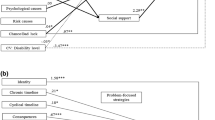Abstract
Mohr et al. (1999) described the psychosocial effects of multiple sclerosis (MS) from the patient's perspective. Three factors emerged: demoralization, benefit-finding, and deteriorated relationships. The benefit-finding factor suggested that some patients with MS benefited from their illness. We investigated the generalizability of these results by replicating the Mohr et al. study using patients with two diseases, cancer (N = 56) and lupus (N = 31). All participants completed the questionnaire developed by Mohr et al. along with the Profile of Mood States. When the data were analyzed, results showed a three-factor solution very similar to the one reported by Mohr et al. Scores on the demoralization factor were positively related to total mood disturbance and average pain ratings and inversely related to benefit-finding. Conversely, patients who perceived more benefits from their illness suffered less. We conclude that benefit-finding is not unique to patients with MS but occurs in patients with other chronic diseases.
Similar content being viewed by others
REFERENCES
Affleck, G., Tennen, H., Croog, S., and Levine, S. (1987). Causal attributions, perceived benefits, and morbidity after a heart attack: An 8-year study. J. Consult. Clin. Psychol. 55: 29–35.
Afflect, G., and Tennen, H. (1996). Construing benefits from adversity: Adaptational significance and dispositional underpinnings. J. Person. 64: 899–921.
Baker, J., and Wiginton, K. (1997). Perceptions and coping among women living with lupus. Am. J. Health Behav. 21: 129–136.
Davis, C., Nolen-Hoeksema, S., and Larson, J. (1998). Making sense of loss and benefiting from experience: Two construals of meaning. J. Person. Soc. Psychol. 72: 561–574.
McNair, D., Lorr, M., and Droppleman, L. (1981). Manual for the Profile of Mood States, Educational and Industrial Testing Service, San Diego, CA.
Mohr, D., Dick, L., Russo, D., Pinn, J., Boudewyn, A., Likosky, W., and Goodkin, D. (1999). The psychosocial impact of multiple sclerosis: Exploring the patient's perspective. Health Psychol. 18: 376–382.
Moran, M. (1996). Psychiatric aspects of rheumatology. Consult.-Liaison Psychiatry 19: 575–587.
Nathan, P., and Gorman, J. (1998). A Guide to Treatments that Work, Oxford University Press, New York.
Taylor, S. (1983). Adjustment to threatening events: A theory of cognitive adaptation. Am. Psychol. 38: 1161–1173.
Tedeschi, R., and Calhoun, L. (1995). Trauma and Transformation, Sage, Thousand Oaks, CA.
Thompson, S. (1985). Finding positive meaning in a stressful event and coping. Basic Appl. Soc. Psychol. 6: 279–295.
Wollman, C., and Felton, B. (1983). Social supports as stress buffers for adult cancer patients. Psychosom. Med. 45: 321–331.
Rights and permissions
About this article
Cite this article
Katz, R.C., Flasher, L., Cacciapaglia, H. et al. The Psychosocial Impact of Cancer and Lupus: A Cross Validation Study That Extends the Generality of “Benefit-Finding” in Patients with Chronic Disease. J Behav Med 24, 561–571 (2001). https://doi.org/10.1023/A:1012939310459
Issue Date:
DOI: https://doi.org/10.1023/A:1012939310459




